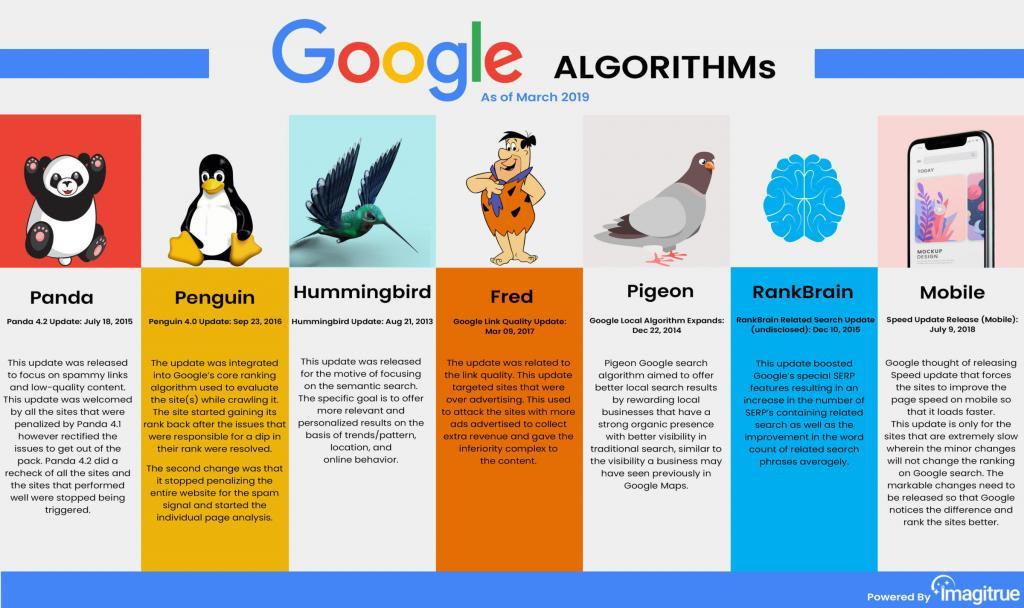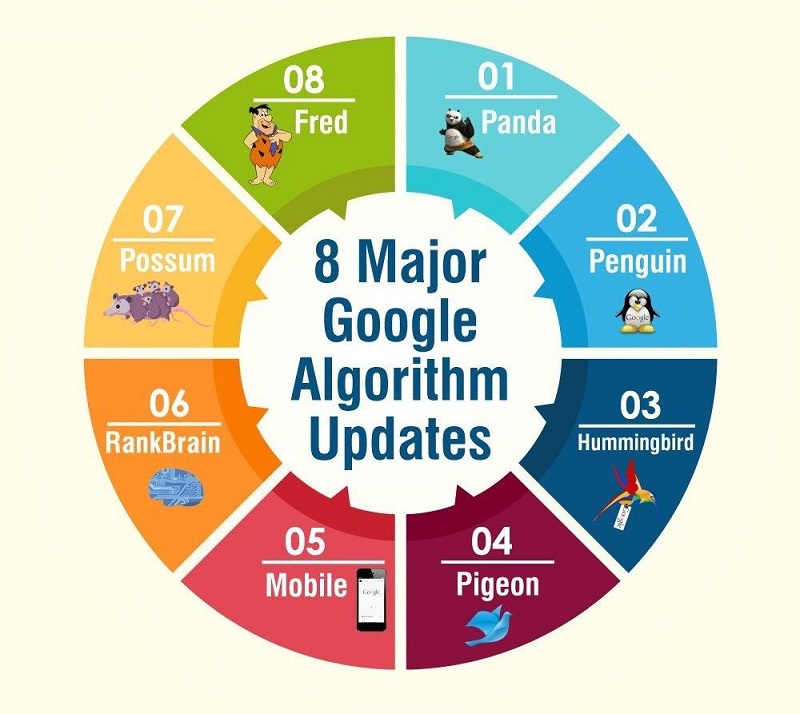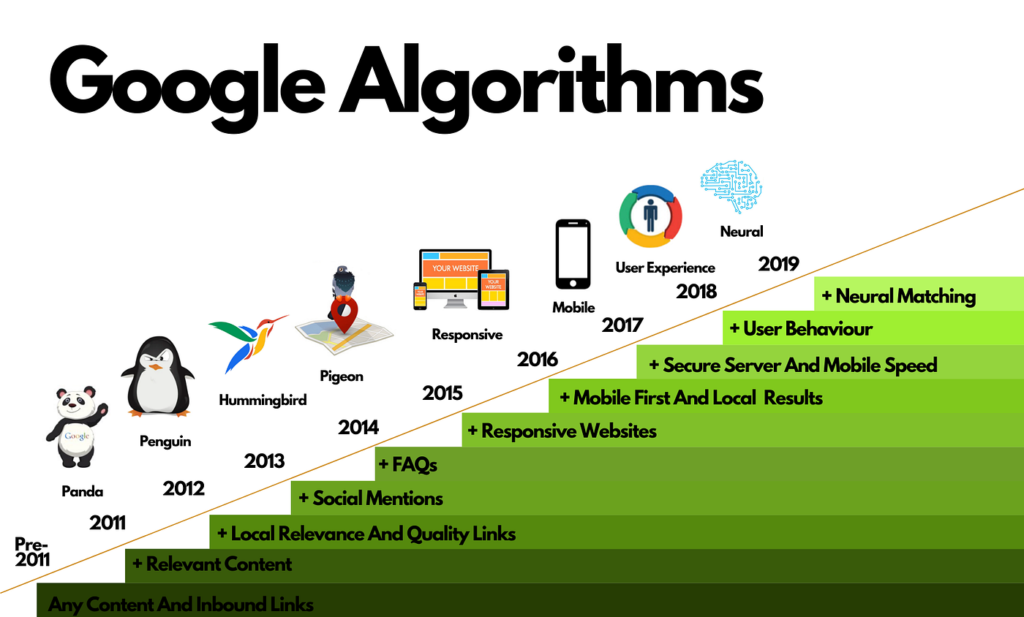- Search engine optimization (SEO) is an ever-evolving field, with Google regularly updating its algorithms to enhance the quality of search results. Staying informed about these updates is crucial for digital marketers and website owners to adapt their SEO strategies effectively. In this blog post, we’ll explore the significance of staying abreast of the latest Google algorithmUpdates and Their Impact on SEO

The Dynamic Nature of Google’s Algorithms
Google’s search algorithms are complex mathematical equations designed to provide users with the most relevant and high-quality results for their queries. Google regularly refines and updates these algorithms to improve the overall search experience. While some updates are minor and go unnoticed, others can have a significant impact on search rankings, user experience, and website visibility.
Recent Google Algorithm Updates
1. Core Updates
Google releases broad core updates several times a year, often referred to as “core updates.” These updates aim to improve the overall relevance of search results. Websites may experience fluctuations in rankings during core updates, and it’s essential to understand that these changes are part of Google’s efforts to provide the best possible results for users.
2. Page Experience Update
The Page Experience Update, introduced in 2021, emphasizes the importance of user experience as a ranking factor. Core Web Vitals, which include metrics like loading speed, interactivity, and visual stability, play a crucial role in determining a page’s user experience. Websites that prioritize a positive user experience are likely to see improvements in their search rankings.
3. Bert Algorithm
Bidirectional Encoder Representations from Transformers (BERT) is an algorithm designed to understand the context and nuances of words in a search query. BERT helps Google better interpret the intent behind longer and more conversational queries, leading to more accurate and relevant search results.
4. Mobile-First Indexing
As the number of mobile users continues to rise, Google has shifted towards mobile-first indexing. This means that Google predominantly uses the mobile version of a website for indexing and ranking. Websites that are not mobile-friendly may experience a decline in search visibility.
5. E-A-T (Expertise, Authoritativeness, Trustworthiness)
Google emphasizes the importance of E-A-T in evaluating the quality of content. Websites that demonstrate expertise, authoritativeness, and trustworthiness are more likely to rank higher. This is particularly crucial in industries where accurate and reliable information is paramount, such as healthcare and finance.
Impact on SEO Strategies
Understanding the latest Google algorithm updates is essential for adapting and refining your SEO strategies. Here’s how these updates can impact various aspects of SEO:
1. Content Quality and Relevance
Google’s algorithms increasingly prioritize high-quality, relevant content. Websites should focus on producing in-depth, authoritative content that addresses user queries effectively. Content should be regularly updated to align with the latest information in a particular industry.
2. Technical SEO Optimization
Technical SEO elements, such as website speed, mobile-friendliness, and secure HTTPS connections, have gained prominence. Websites that invest in technical optimization are more likely to provide a positive user experience, leading to better search rankings.
3. User Experience (UX) Design
The Page Experience Update underscores the importance of user-centric design. Websites with a seamless and enjoyable user experience, as measured by Core Web Vitals, are likely to see improvements in search rankings. Prioritizing UX is not only beneficial for SEO but also for overall user satisfaction.
4. Keyword Optimization and Intent
With the introduction of BERT, understanding user intent has become crucial. Keyword optimization should go beyond exact matches and focus on providing content that aligns with the broader context of user queries. This involves creating content that addresses the informational needs of users.
5. Link Building Strategies
Link building remains a fundamental aspect of SEO, but the emphasis has shifted towards quality over quantity. High-quality, relevant backlinks from authoritative sources contribute significantly to a website’s credibility and trustworthiness.
6. Local SEO
For businesses with a physical presence, local SEO is vital. Google’s algorithms consider factors such as proximity, relevance, and prominence to determine local search rankings. Optimizing Google My Business profiles and acquiring positive local reviews are crucial components of local SEO.

Adapting to Algorithm Updates
To navigate the evolving landscape of SEO, consider the following strategies:
1. Stay Informed
Regularly check industry news, Google’s official announcements, and reputable SEO blogs for information on algorithm updates. Staying informed allows you to anticipate changes and adjust your strategies accordingly.
2. Monitor Performance Metrics
Track key performance metrics such as organic traffic, keyword rankings, and user engagement. Sudden fluctuations may indicate the impact of a recent algorithm update. Monitoring these metrics enables you to identify areas for improvement.
3. Focus on Quality Content
Prioritize the creation of high-quality, relevant content that meets the needs of your target audience. Content that demonstrates expertise and addresses user queries effectively is likely to perform well in search results.
4. Prioritize User Experience
Invest in user experience optimization, including page speed, mobile-friendliness, and a well-designed user interface. A positive user experience not only aligns with Google’s algorithms but also enhances overall user satisfaction.
5. Diversify SEO Strategies
While staying focused on core SEO principles, diversify your strategies to encompass various aspects of digital marketing. This may include social media marketing, email marketing, and paid advertising to create a well-rounded online presence.
6. Adapt and Experiment
SEO is not a one-size-fits-all endeavor. Be prepared to adapt your strategies based on the unique characteristics of your industry and target audience. Experiment with different approaches to discover what works best for your website.
Conclusion
Understanding the latest Google algorithm updates is fundamental to a successful SEO strategy. By staying informed, adapting your approach, and prioritizing the user experience, you can navigate the evolving landscape of search engine optimization. Keep in mind that SEO is a continuous process, and ongoing efforts to align with Google’s best practices will contribute to long-term success in the digital landscape. Stay proactive, stay informed, and stay ahead in the world of SEO.
I hope we can explain Updates and Their Impact on SEO in better way


